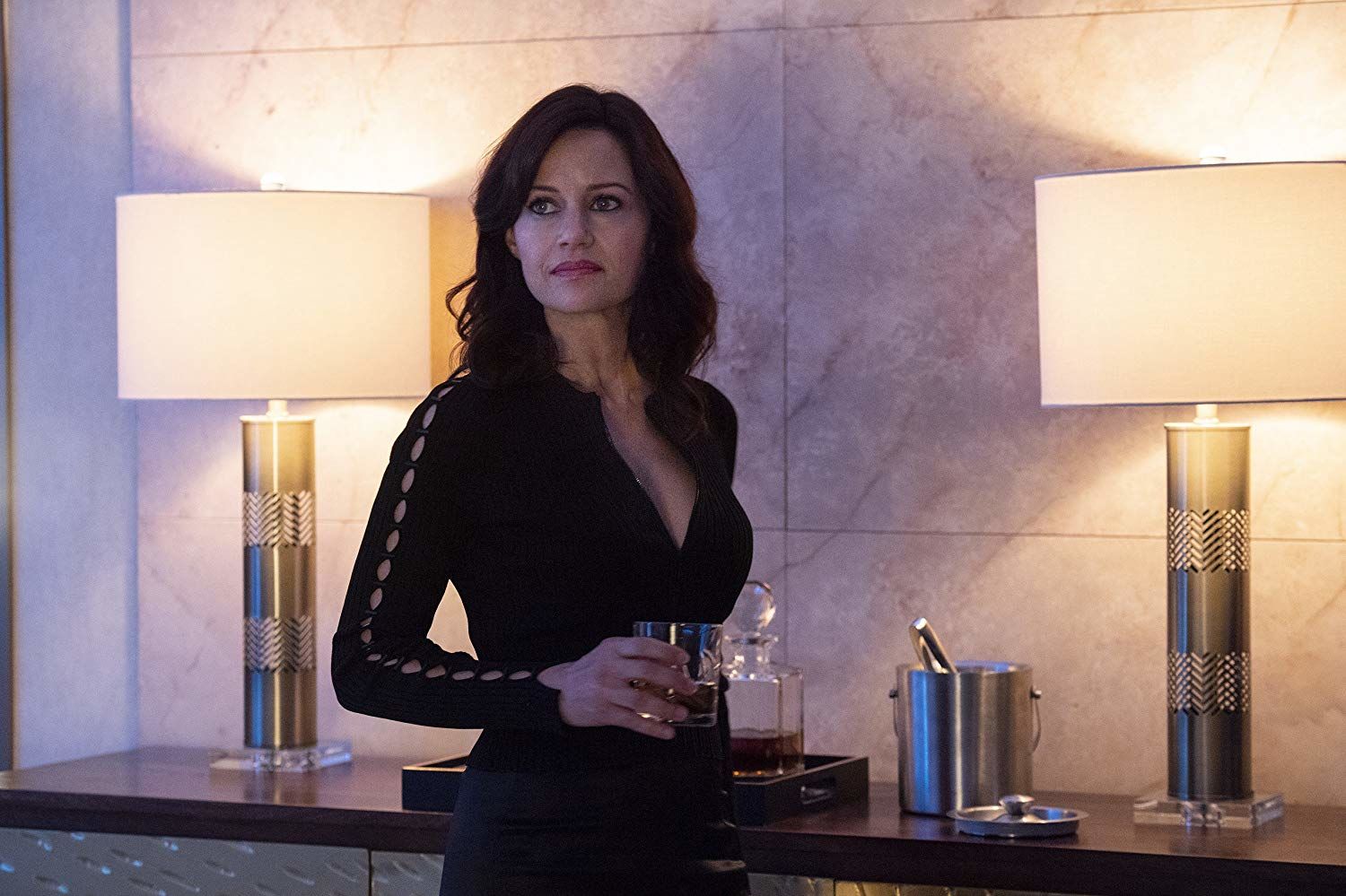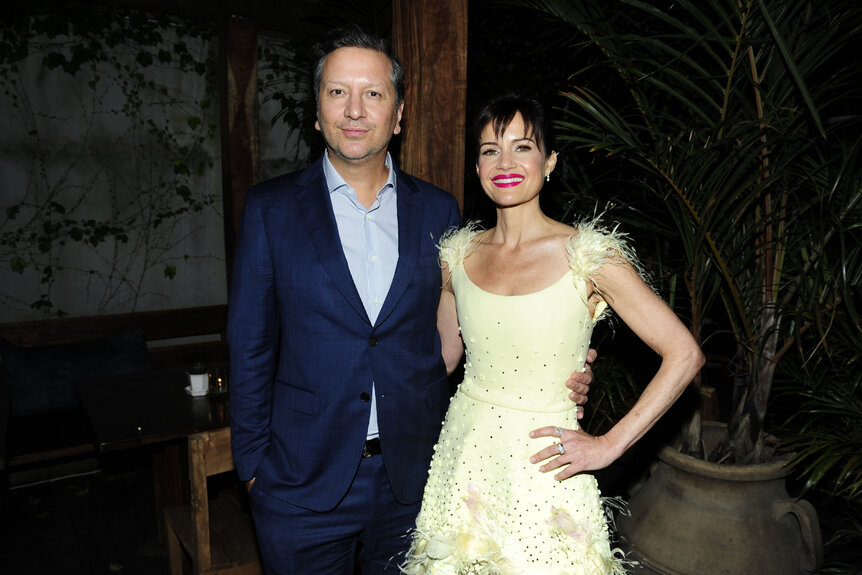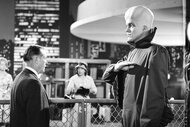Create a free profile to get unlimited access to exclusive videos, sweepstakes, and more!
When the 'idiotic' way to make a show is really the right way (a badass woman helps)

Now that television's storytelling standard has shifted from interchangeable episodic hours to cohesive arcs unfurled over shorter seasons, it has become commonplace, almost to the point of cliché, for showrunners to say the project is more like a 10-hour movie than anything else. The new Cinemax crime drama Jett takes that new age adage to a new level — the story not only unfolds like a movie, the project was also written, pitched, and shot in much the same manner.
For Jett creator (and writer/producer/director) Sebastian Gutierrez, after two decades in film, it was the only way he really knew how to do it.
"I was like, I'm not sure that I can come up with a full story for a season, so I wrote it for three years in between real jobs, wrote the whole season without anybody paying for it, just to see if I could do it," Gutierrez told SYFY WIRE during a recent conversation in New York. "My agents were like, that's idiotic. But I just wanted to prove to myself that I could do it. And then I went to places with the whole thing. It was like, here's the 10 episodes. Give me notes, but basically take it or leave it."
Eventually, HBO took the show to air on Cinemax, with the network's "sophisticated pulp" aesthetic a perfect fit. The show stars Carla Gugino, Gutierrez's real-life wife and frequent collaborator, as the titular master thief and con-woman who finds herself right back on the job after being released from jail — her relationship with a crime boss, played by Giancarlo Esposito, guarantees it. Gutierrez grew up reading pulp and potboiler crime novels, idolizing authors like Elmore Leonard, so while he's spent much of his career making horror flicks (including last year's Elizabeth Harvest) and sci-fi fare (he's the mind behind Snakes on a Plane), Jett was a natural transition.
Critics agree; Jett premiered at the beginning of June and the two episodes that have aired thus far have both received very favorable reviews. Gutierrez spoke with SYFY WIRE at length about what he learned about writing, selling, and making a TV show in the modern era — a feat still easier said than done.
First, basic question: How do you successfully pitch a TV show?
You look around, you're like, man, there's like 500 TV shows, so how hard could it be to sell a TV show? But I think what happened really fast, certainly by the time House of Cards happened at Netflix, is it became so high concept and the Hollywood players so A-list — you have Martin Scorsese and David Fincher at Netflix, that's A-list.
So part of what was tricky with Jett was every place that I went to, everybody loved it, but it's not a very high concept. That's why high concept happens — they're like, "OK, she's a female criminal... and…" They don't say that, but that's kind of the feeling. But since we have to break through all the noise, because it's so execution-dependent, I understand that everybody's like, "on paper this could be any crime show, so how do we stand out?"
So how do you stand out? How do you not make it a weekly procedural or crime of the week show?
The first episode of Jett acts as a sort of prologue to the story because it's really telling what happened before, introduces everybody, and the fallout from that job is really is what the next eight episodes are about. Even in the second episode, you could still think, oh, is this going to be like a crime of the week show? So the third one is different. And the fourth one, too. They're all slightly different. I think that came from, because I'd never done TV, I was like, I'm just going to try and make a one-hour movie every week with Jett as the central character.
Cinemax makes sense for the show, in that they have done plenty of cool, stylish crime stuff.
We say that we're in this golden age of television, but the most part TV is still not very cinematic. And by that I mean it's still filmed the same way that it used to be, which is a master or medium close and close-up. And then Steven Soderbergh came in with The Knick and I thought, well this is visceral, like in a movie where the camera's just focusing on one person and not doing coverage and it's just acting like a really cool story.
I have always wished that cable — and this was before there was 500 shows being made — acted more like AA or AAA baseball to the Major Leagues, or what used to be, when there were record labels, indie record labels and then you went to a major. Now everybody's expected, when they make their first movie, to make this Marvel-sized blockbuster or else the system has no use for you. And that's just really bad for creativity obviously. And that's why everything looks the same. Everything is done with the same cookie-cutter formula.
It seems like very few companies make most of the projects now, still. You've done some of both.
I'm so outside the system because I've done my own thing for so long. My day job has always been doing rewrites or scripts for Hollywood, but my movies I've always been completely indie, you know? I made these movies out of necessity, you know, I got really burnt on this movie Rise, which ended up being one of those Hollywood cliches, me and the cast on one side and the producers on the other at the end, and what came out of that was not what I meant at all.
It's not horrible, but it's a mediocre movie. And it was a really valuable lesson for me, which was that, I never again want to do something that for the money people or the producers, the only reason they want to do it is to make money. Which sounds really Pollyanna, but it's a really shallow endeavor otherwise, because if it doesn't make a s**t-load of money, then you feel empty.
So where do you go from there?
And so after that I really felt like, I don't want to spend three years of my life doing that kind of thing again. And that was the birth of Women in Trouble to Electrolux, which then led to Girl Walks into a Bar, which then led to this other movie that never really came out, Hotel Noir, that was like the second of those YouTube movies. Suddenly I was like, huh, I can just grab $50,000 and some actors, I don't even need a set and just come up with a series of scenes, see if I can figure out this video camera, because I hate video cameras. It was a great exercise for me after dealing with studios or mini-majors, to figure out is it really that hard to make a movie?
I know that this seems like something that you should learn in film school, but the lesson in those movies was that the people that you need in a crew, to shoot a closed set, it was a nude scene, the only people there are the actors, the boom guy, the sound guy, the camera guy, hair and makeup. You only need seven people to make a movie. The other 93 people are a great luxury to have. I was the line producer and I was the script supervisor. It was absolute guerrilla filmmaking and one led to another led to another and the whole point of those movies, which are really miniatures, was can we just make a movie that can get us into SXSW, and have fun with our friends?
Those films sold, too.
Yeah, but suddenly I looked around and I was like, holy s**t, everybody thinks that I'm this fringe filmmaker who wants to make these talky movies with no set. That's when I moved to New York. I realized I had to remove myself because Hollywood has such little imagination. That's when I wrote Jett and that's when I wrote Elizabeth Harvest, and Elizabeth Harvest just went before Jett.
I had lots of meetings on Jett. The big question was me saying, I know I haven't done television before but I'm going to do this just like a movie. So just give me the money and I'll produce it, write it, direct it, show-run it, don't worry about it. Which of course is a tough [sell].
There were several iterations of the show where it was like, well can't direct it, or are you willing to bring on another director? There were many, many compromises. We talked to networks and all of it was crazy double standards, not necessarily out of misogyny or whatever, but it was like you can't have a female character that has two sentimental relationships that imply sex in the same episode. It was really like, wow, this is 2017 and we're having this conversation. All of it is really so, so conservative and so corporate-driven. Cinemax/HBO was really was the one place that had very few things that they wanted to change.
And you're doing all this, writing this for your wife. How was that, putting her in those situations, creatively?
In my case, it's awesome, because I was a huge fan of Carla before we were a couple. And I think that she's still so under-utilized and I know what she can do and what things scare her. So it's always really cool to give her something that isn't like what she's done before.
If this was a guy, none of these things would come up.But if it's a woman, they're like, well, is she being victimized or is she the wrong one? And you're like no, she's not cool or a bad villain, but you wouldn't ask that of a Lee Marvin or Clint Eastwood.
She does have a daughter, which I guess helps humanize her a bit more.
You watch movies like, say, The Outlaw Josey Wales, Jett behaves a little bit like that. That is a movie about a family assembling around Clint Eastwood. He's still the stoic, befuddled character and there's humor in that. this character and that's what makes them use humor in that, that's what makes it even more iconic, the fact that he was fiercely loyal to these people and he'll protect them.
Jett is like that because she has a daughter and she has this friend Maria. Things will start happening around her where it was very important to me that it's not like she was an ice-cold killer bitch from hell or something. She's not angry. This is her job and she's very good at it.
Jett airs on Cinemax at 10pm on Fridays.



























